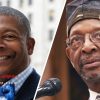By DeWayne Wickham, USATODAY
When Nelson Mandela arrived in New York City four months after his 1990 release from detention after 27 years in a South African prison, he was widely – and wrongly – seen as just the leader of an African struggle for self-determination. But as I quickly learned, he was much more than that.
During a Yankee Stadium speech that I witnessed as a member of a small group of journalists invited to cover his 12-day, eight-city U.S. visit, the then-71-year-old Mandela claimed a special connection to the large black crowds that would turn out for him wherever he went. There is an “unbreakable umbilical cord” that connected African Americans and blacks in South Africa, he said that day.
At the time, his words sounded to me more like the kind of rhetorical flourish a visiting politician utters to win over a foreign audience than a sincere expression of kinship. It was, I thought, just some comforting words for his audience. Like the “Ich bin ein Berliner” speech President Kennedy gave in Berlin in 1963, or the 1987 speech President Reagan gave in that city urging Soviet leader Mikhail Gorbachev to “tear down” the wall that symbolized the Cold War division between East and West.
But by the time Mandela ended his first U.S. visit in Oakland, Calif., at the end of June 1990, I understood that he was no fawning, globe-hopping politician.
When the plane that brought him to the U.S. arrived nearly two hours late, he kept New York City Mayor David Dinkins and a host of other muckety-mucks waiting at City Hall while he honored a commitment to visit Boys and Girls High School, a mostly black public school in the Brooklyn section of the Big Apple. His audience there was made up of mostly children and held little promise of much media attention.
A few days later, during our plane ride to Detroit, Mandela asked a flight attendant for the words to Marvin Gaye’s song What’s Going On. That night he began his speech to a mostly black crowd of 49,000 people with the opening words to Gaye’s anti-violence anthem:
“Mother, mother
There’s too many of you crying
Brother, brother, brother
There’s far too many of you dying”
Mandela wasn’t talking about the ongoing violence in South Africa between supporters and opponents of apartheid, the pigmentocracy that country’s white minority created to dominate the black majority. While he was committed to dismantling that morally corrupt system, Mandela was appealing that night for an end to the violence that wracked the Motor City.
As much as he wanted Americans to rally in support of his African National Congress‘ efforts to put the last nail in the coffin of South Africa’s apartheid state, Mandela repeatedly found time during his first U.S. visit – especially in private conversations with me and other journalists – to agitate for a better life for blacks in this country.
His persistence in doing that in every city he visited moved me to acknowledge Mandela’s American connection in a column I wrote July 2, 1990, after his speech to 78,000 people in the Los Angeles Memorial Coliseum:
“With rare exceptions, most African Americans have found their heroes closer to home – people such as Frederick Douglass, Mary McLeod Bethune, Malcolm X and (Martin Luther) King. Not since Marcus Garvey, a Jamaican immigrant, began rallying blacks to his Universal Negro Improvement Association in 1916 have so many African Americans linked their lives so closely to someone from abroad.”
History, no doubt, will remember Nelson Mandela as the father of South Africa’s majority-rule, democracy. But I’ll remember him, first and foremost, as the towering figure of the unbreakable umbilical cord that connects blacks from Harlem to Johannesburg.
DeWayne Wickham, dean of Morgan State University’s School of Global Journalism & Communication, writes on Tuesdays for USA TODAY.










![AEO, Ras Kass, Nkechi Taifa, Kymrence Young & Tricky Trev.) (feat. Young RJ [Slum Village], Ras Kass, Nkechi Taifa & Kymrence Young)](https://ibw21.org/wp-content/uploads/2024/12/organizing-anthem-AEO-Agitate-Educate-Organize-1600x900-1-100x100.jpg)


